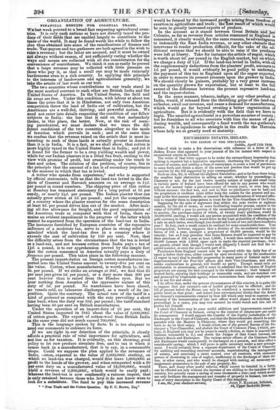ENCUMBERED ESTATES, IRELAND.
TO THE EDITOR OF THE SPECTATOR.
Dublin, April 11th 1848.
SIB—I wish to make a few observations with reference to a letter of Mr, Joshua Evans that appeared in your journal of the 1st instant with respect to encumbered estates in Ireland.
The writer of that letter appears to be under the extraordinary. impression that nothing is required but a legislative enactment, shortening the inquiries of pur- chasers of estates, and settling a form of conveyance, to cause a host of purchasers to come forth and obtain a share of the acres and perches that would be put up to auction by the bill suggested by your correspondent. Such an idea, Sir, is without the slightest foundation; and so far from there being the smallest legal obstruction in selling an estate, whether by proceedings in Chancery or not, for the last twelve months estates of large and small value in various parts of Ireland have been offered for sale to any person who would pay on the annual value a purchase-money of twenty years, or even less, but without success: the fact was, and now is, that no purchasers can be had; and the proprietors or creditors must either keep the estates for the present and ma- nage in the best manner possible, or consent for the considerations of loveand affec- tion to transfer them to some person in trust for the Vice-Guardians of the Union. Supposing for the sake of argument that within the next twelve or eighteen months, by the aid of steam, or some facilitating transfer process, estates to the value of 500,0001. a year (a portion of the encumbered property) could be set up to auction, the purchase-money of which, at twenty years' purchase, would be 10,000,0001. sterling, I would ask any person acquainted with the condition of the gold currency in this country, would there be the least probability of effecting such a sale on such terms, even though you should sell in lots of two and three hundreds year? In fact, such a result cannot be realized for some considerable time. Your correspondent, however, suggests that a division of the encumbered estates into farms of 501. a year, amongst a proprietary of 60,000 persons, would be the remedy; but as I may presume that those farmers would be expected to pay for their purchase of 501. a year at least 1,0001., I would then endeavour to find out 60,000 farmers with 1,0001. spare cash to make the required purchase; but I am greatly afraid that though I would seek diligently I would not find the re- quired number, or even the one-fourth part of it. Purchasers from England cannot now be expected while the daily fear of an upset is before their eyes, either caused by open revolution or by the confiscation (1 regret to say) that is steadily progressing in many parts of Ireland under the superintendence of the Poor-law officers and their Vice-Guardians, and which, unlike confiscations in general, will benefit no party. Though many evils are attributable to absenteeism, still it must be admitted that the estates of English proprietors are among the best-managed in the whole country: their tenants are treated fairly, enjoying their holdings at reasonable rents, and are watched over and protected by respectable agents, whose instructions from their employers are not to use fire and sword. I do affirm that, under the present circumstances of this country, it is quite idle to suppose that any extensive sale of landed property can be effected; and the bill at present before the House can only be considered a measure to tickle the public mind on that point: and indeed your correspondent thinks that the Attor- ney-General's representative created by that bill would only tend to expense; and certainly if the remuneration of this new officer would depend on watching the proceedings in a cease, you may rest assured he would watch and tire out all parties but himself. I admit that there may be some useful additions and improvements caused in the Court of Chancery in Ireland, owing to the number of estates now put under its management. I would suggest the transfer of the Equity jurisdiction of the Exchequer to the Court of Chancery, and that the Remembrancers should be amal- gamated with the Masters in Chancery, where they would get something like work to do for their salary. I would create one of the present Barons of the Ex- chequer a Vice-Chancellor, and abolish the Court of Common Pleas, (which, per- haps, in England you may not be aware is nearly a fiction, as there is scarcely any business transacted in it,) and divide the Judges of that Court between the Queen's Bench and Exchequer. The various minor officers of the Common Pleas and Exchequer would consequently be discharged on a pension, and thus effect a considerable saving; which I will prove is quite necessary under a new arrange- ment. I would certainly form a separate department of the Court of Chancery for auditing and examining receivers' accounts, superintending the management of estates, and exercising a strict control over all receivers, with summary powers of dismissing in case of neglect, inefficiency in the discharge of their du- ties, or other cense, and who would be charged with making all necessary ar- rangements preparatory to the sale of any property, Sr.e
These, and many other useful reforms, which cannot be detailed in a letter, can be effected not only without the increase of one shilling to the taxation of the country, but actually cause a saving of some thousands a year; and which would not only facilitate the management and transfer of property in Ireland, but busi- ness of every description in the Equity Court of this kingdom.
44, Upper Sackville Street.


























 Previous page
Previous page